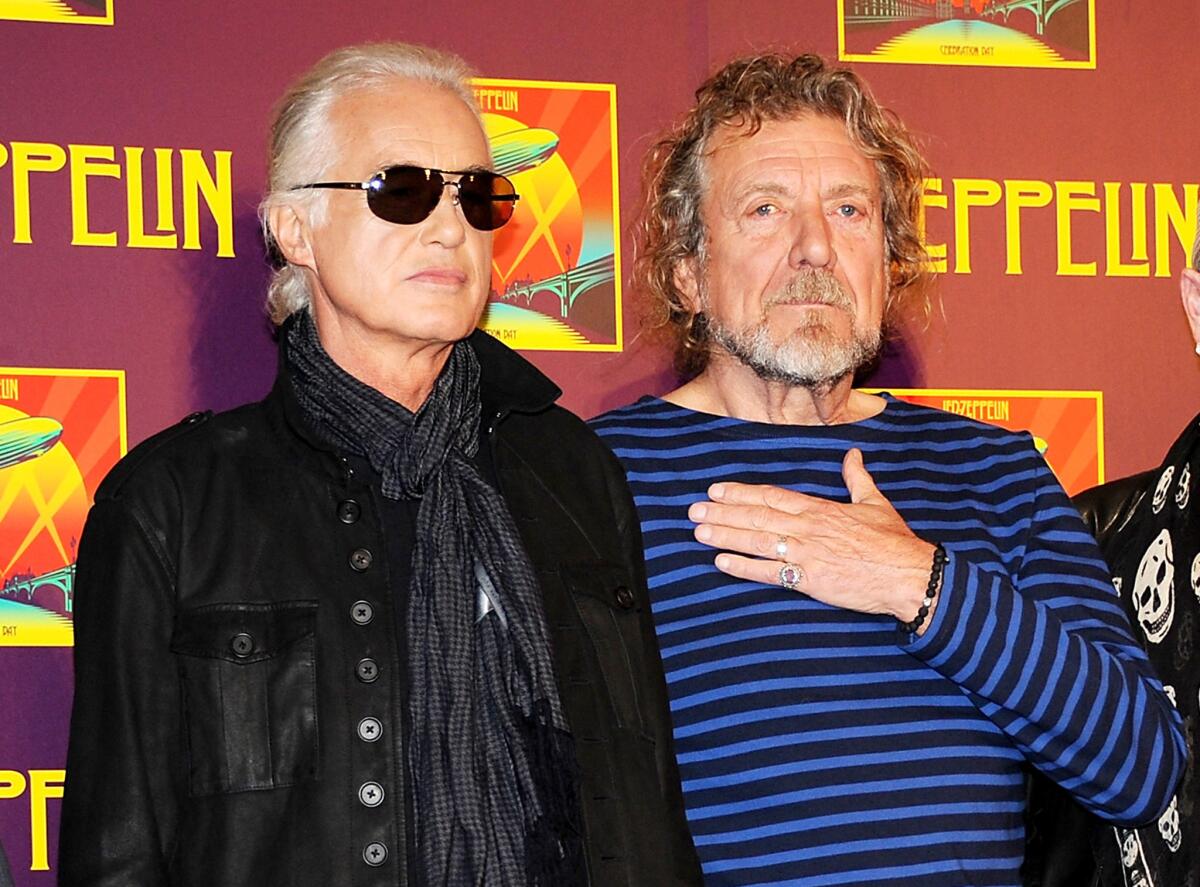The ‘Stairway to Heaven’ case: No matter what the court decides, the plagiarism debate will never end

Regardless of the verdict, the debate as to whether Led Zeppelin’s “Stairway to Heaven” was ripped off from L.A. rock band Spirit’s song “Taurus” will likely remain unsettled.
U.S. District Court Judge R. Gary Klausner is expected Wednesday to send the copyright trial over Led Zeppelin’s “Stairway to Heaven” to the eight-member jury after lawyers for both sides make their closing arguments in the morning.
No matter the panel’s decision, however, it’s doubtful it will put an end to public debate on the issue – not because of any questions about jurors’ ability to sort through more than 20 hours of testimony from a parade of more than a dozen witnesses, but because of the specifics of what they’ll be asked to decide.
The issue is not how close Zeppelin’s 1971 rock classic sounds to the record that Spirit released in 1968 on its debut album. Instead, it’s whether “Stairway” cribs substantially from the “Taurus” sheet music submitted 48 years ago to the U.S. Copyright Office.
It’s a simple one-page representation of the song’s melody and chord progression, but not a forensically detailed dissection of the recorded work that Spirit released to the public in the year after the celebrated Summer of Love.
See the most-read stories in Entertainment this hour >>
The way U.S. copyright law is structured, it’s not sound recordings that come under fire as the source of infringement, but the musical composition as detailed in sheet music.
In this case, filed by Michael Skidmore, a trustee for the estate of Spirit guitarist and “Taurus” songwriter Randy Wolfe, better known by the nickname he was given by Jimi Hendrix, Randy California, jurors heard only re-creations of the sheet music as performed alternately on acoustic guitar and electric keyboard.
The lawyer for Wolfe’s estate, Francis Malofiy, tried without success to introduce Spirit’s recording of the song, and to get confirmation from Zeppelin guitarist and songwriter Jimmy Page that certain key elements of “Stairway” did not appear in what’s referred to in court as the “deposit copy” of the song he wrote in 1970 with singer Robert Plant.
The Wolfe estate also was barred from referencing previous instances where Led Zeppelin had to amend songwriting credits, split proceeds or otherwise settle cases of infringement brought against the band, limited by Klausner to establish only whether “Stairway” was “substantially similar” to “Taurus” as judged by ordinary listeners.
Much of the testimony from musical experts, therefore, boiled down to finding similarities and dissimilarities in what was written on the printed page.
The Wolfe estate’s case put heavy emphasis on the common descending chromatic minor-key line in “Taurus” and “Stairway,” as well as three pairs of notes occurring within the first two minutes and 14 seconds of “Stairway.” Before the trial began, the case was narrowed down to that slow passage evoking Renaissance- or Baroque-era folk music, rather than the remaining six minutes of “Stairway.”
In response, Zeppelin’s defense experts testified that the descending chromatic line could be found in numerous pop songs written over the last century, and that the incidence of three pairs of notes in each melody was “absolutely meaningless,” according to New York University musicology professor Lawrence Ferrara.
Lesson to be learned for professional and amateur musicians alike: Any element of a song you’ve written that you consider to be “significant” and “important” had better appear in the deposit copy sheet music when it’s submitted for copyright protection.
There was also extended testimony over how important the opening of “Stairway” was in comparison to the rest of the song, as part of the metric that could come into play if infringement is found and money is to be awarded.
Would Page and Plant (and their record label and music publisher) be ordered to split all the money that “Stairway” has earned during the period for which they would be liable, dating to May 2011 (three years before the 2014 reissue of the “Led Zeppelin IV” album that triggered the lawsuit)?
Should they be on the hook for only 25% of that revenue since the contested section is only about one-quarter of the length of the song? Should it be reduced further because of the relative importance of Plant’s lyrics?
That’s a potential monetary quagmire.
Musical similarity, however, was just one of three elements that Klausner outlined in allowing the infringement trial to proceed.
In addition, the Wolfe estate was instructed to demonstrate that it was indeed the legal owner of the the “Taurus” copyright, and to prove that Page had “access,” or opportunity, to hear “Taurus” before he wrote the music for “Stairway.”
Because “Taurus” is an instrumental, there was no allegation that Plant’s lyrics infringed on the song, but he remained as a defendant as co-writer of “Stairway.”
Witnesses for the Wolfe estate, including two former members of Spirit, noted several concerts in 1968 and ’69 where both groups performed, but none testified conclusively to seeing Page nearby at any time that Spirit was performing “Taurus.”
Zeppelin’s guitarist said he had bought two of Spirit’s albums in the late ’60s, but identified them as the band’s second and third albums, and said he’d never heard “Taurus” until public discussions over perceived similarities began circulating on the Internet “a couple of years ago.”
Copyright law experts note that judges typically advise juries that the greater the degree of access that can be proved, the less the degree of similarity needs to be shown.
Ultimately, however, Spirit fans are likely to continue to argue that Randy California deserves some measure of recognition for his composition. During his lifetime, he said in interviews that he was fine with the similarity to “Stairway” but that it had ultimately become a sore point for him.
And Zeppelin fans will still cling to “Stairway” as one of the signature works not only in the band’s 87-song catalog but also in all of rock music.
Follow @RandyLewis2 on Twitter.com
For Classic Rock coverage, join us on Facebook
ALSO
Remembering Prince Be of P.M. Dawn, a nostalgist who heard the future
John Prine and Sturgill Simpson will share a stage at the Grammy Museum
EDC 2016: A lack of festival deaths bodes well for its future
More to Read
The biggest entertainment stories
Get our big stories about Hollywood, film, television, music, arts, culture and more right in your inbox as soon as they publish.
You may occasionally receive promotional content from the Los Angeles Times.










